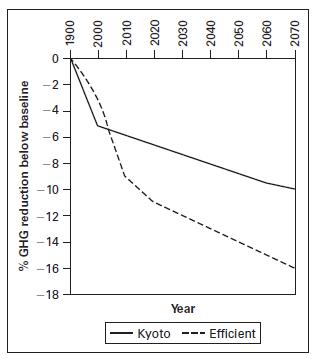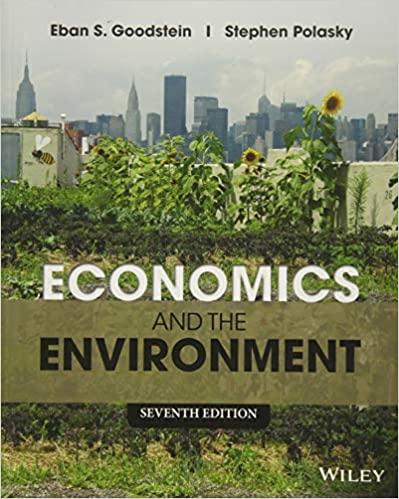Yale economist William Nordhaus has done a lot of work on benefit-cost analysis of the Kyoto treaty.
Question:
Yale economist William Nordhaus has done a lot of work on benefit-cost analysis of the Kyoto treaty. Bearing in mind the vast uncertainties associated with estimating both the costs and the benefits of the Kyoto emission reductions, consider his results in Figure 21.3. By 2070, relative to a business-as-usual increase in CO2 emissions, the original Kyoto Protocol would have led to global emission cuts of 15%, and the efficient policy would lead to cuts of about 10%.
1. Assume that Nordhaus used a 5%discount rate for costs and benefits. Assume also that most of the benefits of reducing emissions today come in 80–100 years, while most of the costs will occur in the next 10–20 years. How would the “efficient” curve look different if he had instead used a 3% discount rate?
(Fill in the illustrative chart for the Kyoto Protocol to help you with your answer: Is Kyoto more efficient at the 3% discount rate or the 5% discount rate?)

Figure 21.3

2. Nordhaus is generally an efficiency advocate. And yet, following the presentation of the results in Figure 21.3, he concluded: “There is little appreciation of the importance of ‘institutional innovations’ of this kind, and even less appreciation for the fact that there are no mechanisms for dealing with economic global public goods like global warming. For this reason, the Kyoto-Bonn Accord may be a useful if expensive guinea pig.
Operating the Kyoto-Bonn mechanism will provide valuable insights on how complicated international environmental programs will work. It is hard to see why the United States should not join with other countries in paying for this knowledge.”
What does the “global public good” nature of global warming help explain?
3. In fact, from 2005-2012, the Kyoto Treaty moved ahead without U.S. participation.
Referring to this chapter and Chapter 16, what important piece of knowledge do we hope to get from the European Trading System?
4. Nordhaus also says of Kyoto: “Economic analyses of the accord have pointed to its inefficiencies, especially the shortcomings from using pure quantity-type instruments such as emissions constraints with no price caps or tax instruments . . . therefore, it might be preferable to redesign the accord along the lines of a globally harmonized carbon tax.”
Why might country-specific carbon taxes be preferable to an international capand-
trade system for carbon? What might be lost by not allowing international trading?
Step by Step Answer:

Economics And The Environment
ISBN: 9781118539729
7th Edition
Authors: Eban S. Goodstein, Stephen Polasky





